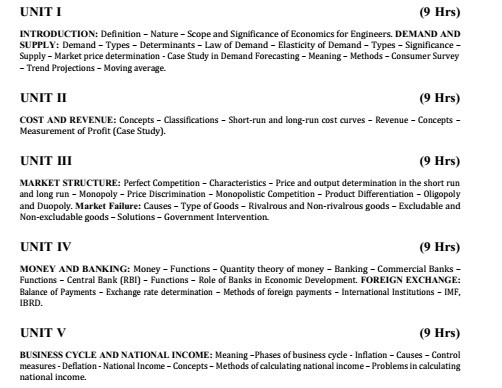
Course Outcomes:
• To Describe the role of economics in the decision-making process and perform calculations regarding interest
formulas.
• To Estimate the Present, annual, and future worth comparisons for cash flows.
• To Calculate the rate of return, depreciation charges, and income taxes.
• To Enumerate different cost entities in estimation and costing.
• To Explain the elements of budgeting and benchmarking.
Program Outcomes (POs)
• Apply the knowledge of mathematics, science, engineering fundamentals, and economic principles to solve complex engineering problems, especially in decision-making and project evaluation.
• Identify, formulate, research literature, and analyze economic problems such as market failures, demand forecasting, and cost estimation using established principles of economics.
• Design economically viable solutions for engineering projects by analyzing cost structures, revenue models, and various market conditions.
• Use modern tools and forecasting techniques such as trend projections, moving averages, and financial models to predict economic trends and support business decisions.
• Understand the impact of economic policies, financial institutions, and market structures on society and demonstrate knowledge of contemporary issues like inflation, deflation, and the role of banks in economic development.
• To Describe the role of economics in the decision-making process and perform calculations regarding interest
formulas.
• To Estimate the Present, annual, and future worth comparisons for cash flows.
• To Calculate the rate of return, depreciation charges, and income taxes.
• To Enumerate different cost entities in estimation and costing.
• To Explain the elements of budgeting and benchmarking.
Program Outcomes (POs)
• Apply the knowledge of mathematics, science, engineering fundamentals, and economic principles to solve complex engineering problems, especially in decision-making and project evaluation.
• Identify, formulate, research literature, and analyze economic problems such as market failures, demand forecasting, and cost estimation using established principles of economics.
• Design economically viable solutions for engineering projects by analyzing cost structures, revenue models, and various market conditions.
• Use modern tools and forecasting techniques such as trend projections, moving averages, and financial models to predict economic trends and support business decisions.
• Understand the impact of economic policies, financial institutions, and market structures on society and demonstrate knowledge of contemporary issues like inflation, deflation, and the role of banks in economic development.
- Teacher: RAJESHKUMAR K
- Teacher: Kavitha C
- Teacher: Nithiya Priya D
- Teacher: Arokiaraj R
